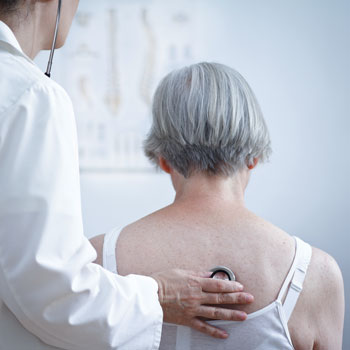Civil surgeons can help pave the way to citizenship
An FACP explains what a civil surgeon does and why he thinks more internal medicine physicians should consider doing it.
Did you know that internal medicine physicians can also be surgeons? Civil surgeons, that is.
Anyone immigrating to the United States needs to undergo a medical examination by a physician. If the person is emigrating directly from their home country, the exam is done there by a panel physician authorized by the U.S. Department of State. But candidates for citizenship who are already in the United States or those requesting a green card must be examined by a civil surgeon.

Civil surgeons are designated by U.S. Citizenship and Immigration Services (USCIS), and any U.S. physician with a medical license in good standing and at least four years of experience in general medicine or a related specialty can apply. The application involves submitting a Form I-910 and paying a filing fee of $785.
In addition to performing a clinical exam, the civil surgeon is responsible for verifying candidates' identities and confirming that they have been tested for certain communicable diseases and have received certain vaccinations. Civil surgeons also need to determine whether candidates have any medical conditions that would categorize them as inadmissible, such as a current physical or mental disorder associated with harmful behavior or a substance use disorder involving a controlled substance.
David Holcombe, MD, FACP, an internal medicine physician in Alexandria, La., has served as a civil surgeon for the past six years. He recently spoke to I.M. Matters about what the job entails and why he thinks more physicians should be doing it.
Q: How did you get started as a civil surgeon?
A: Five or six years ago, I was approached by the Catholic Diocese of Alexandria because they had a refugee center, and they didn't have anyone to do the civil surgeon exams. I was formerly the director for the Office of Public Health for central Louisiana, which does TB surveillance and treats sexually transmitted infections, all of which are included in these exams, so it was natural for me to combine the two.
Some months later, the refugee center closed but I kept doing the exams, and that was over 1,000 patients ago. I volunteer my time to do this through a local free clinic. This has been a huge service, and we need more people to be aware of it and participate, especially in rural areas and for people who are underserved.
Q: If you're an immigration candidate trying to find a civil surgeon to conduct this exam, where do you look?
A: On the USCIS.gov site, they have a civil surgeon locator, a section that says, "Find a Civil Surgeon." Every two years, they'll send you paperwork that says, "Are you still doing this? If you are, sign here." That ensures the website includes only civil surgeons who are currently active. If you go to that site and put in a ZIP code for Alexandria, Louisiana, you'll see one dot. That's me.
Q: How much time does it take to serve as a civil surgeon?
A: This can be part of somebody's regular practice. They just have to set time aside to do it. To do a correct exam, fill the paperwork out, and talk to people, ask them the questions and so forth, takes about a half an hour. … There's no reason why anybody who has a medical license and is at an institution that is interested in doing this couldn't do it.
You need to be able to draw blood on site or at a laboratory of your choice, so we do it through the Office of Public Health. If we have people with private insurance, we send them to a private lab. They're only going to need a tuberculosis test, a urine smear for gonococcus, depending on their age, and a rapid plasma reagin test for syphilis. For vaccines, adults need a Tdap [tetanus, diphtheria, pertussis], MMR [measles, mumps, rubella], varicella, COVID, hepatitis B, and influenza between October and March.
Q: Once the exam is done, what happens to the report?
A: The form you fill out is an I-693, Report of Immigration Medical Examination. Once it's done, you put it in an envelope, and you seal the envelope, and you sign your name on where you sealed it. Then you apply a civil surgeon stamp that says, "Do not open if you're not USCIS." Lastly, you put tape across the signature fold. Most of the people will take the document and give it to their lawyer, or if they're doing it on their own, they send it directly to USCIS. They can't bend it, staple it, or put holes in it. There are rules about the process, but it's not rocket science.
Q: Is it typical for civil surgeons to charge for these exams, or is it more common to do it pro bono, as you do?
A: I believe most do charge people, and the government doesn't cap the fees the examining physician can charge. This turns out to be a real problem. The people who need these exams are often not well-to-do and could be facing a charge of $400 or even much more per person, prohibitive for a large family. Insurance will not pick up this exam, so this is all out of pocket.
Because I don't charge, I have people drive from as far as Texas and Mississippi, because there's either nobody there to do it, or those who do charge exorbitant fees. Anybody who calls me, the first question is, "How much does this cost?" When I say, "Nothing, but you can give a donation to the clinic," there's this stunned silence on the other end of the phone.
Q: What would you consider a reasonable fee for this service?
A: I can understand needing to charge some sort of fee. With $200 to $300, you're going to cover your office expenses—it depends on where you work and in what circumstances—but anything over $400 is just not justified. If you do the labs and vaccinations on site, of course, you may need to charge more. But if you don't, you're just talking to people, doing an exam, and reviewing their documents. If you can do it pro bono, you'll be very popular, for sure.
People will pay a reasonable fee, but some of these fees are just unreasonable, in my opinion. I'd advise physicians not to view this as a profit source. All that's going to do is make you want to see as many people as possible as cheaply as possible. That's a disservice to the patients, and a disservice to you.
Q: What are some of the challenges of the job?
A: It does take time to coordinate the labs and vaccines and to fill out the paperwork. You have to have patience with people who don't always speak English well. Most will bring in somebody who can translate, but sometimes not, and it's a real challenge, so you have to have some patience for that. Also, some people just don't understand the whole process, so they haven't gotten the right vaccines, for example.
Q: What are some of the benefits of being a civil surgeon?
A: My Spanish has gotten a lot better, and it also gives me a chance to use my French. I went to medical school in Belgium, so I speak French fluently. Also, we have osteopathic medicine students who rotate through our Office of Public Health, and I'm able to get them involved. One morning on their rotations, I take them to do these exams. We currently do seven or eight exams one morning a week, with at least one or more in Spanish. Beforehand, I've explained to the students what the requirements entail, because it brings up stages of syphilis, treatment of syphilis, gonorrhea, tuberculosis and the difference between active and latent, and tuberculosis treatments. It's very educational for them. They also get to hear several languages.
Q: What advice would you give other physicians who might be interested in becoming a civil surgeon?
A: I would just encourage people to look into it, especially if you're multilingual. It's not well known and it's an incredible public service. It's needed, especially in rural America, where there is a lot of immigration. It's a gratifying thing to do, and it's not difficult, even though it may sound intimidating at first. Clients are very nice and very appreciative, and it's gratifying to talk to them, especially in their native language. You end up traveling all over the world without leaving your office.



